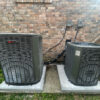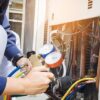Recent Posts
-
 Why HVAC Maintenance is a Must in Katy, Texas: 5 Essential Reasons April 7, 2024
Why HVAC Maintenance is a Must in Katy, Texas: 5 Essential Reasons April 7, 2024 -
 Breathe Easier in Fulshear: The Overlooked Importance of Indoor Air Quality March 14, 2024
Breathe Easier in Fulshear: The Overlooked Importance of Indoor Air Quality March 14, 2024 -
 Repair or Replace: 5 Questions to Ask Yourself about Your HVAC March 6, 2024
Repair or Replace: 5 Questions to Ask Yourself about Your HVAC March 6, 2024 -
 Extend the Life of Your HVAC: The Power of Regular Maintenance February 28, 2024
Extend the Life of Your HVAC: The Power of Regular Maintenance February 28, 2024
